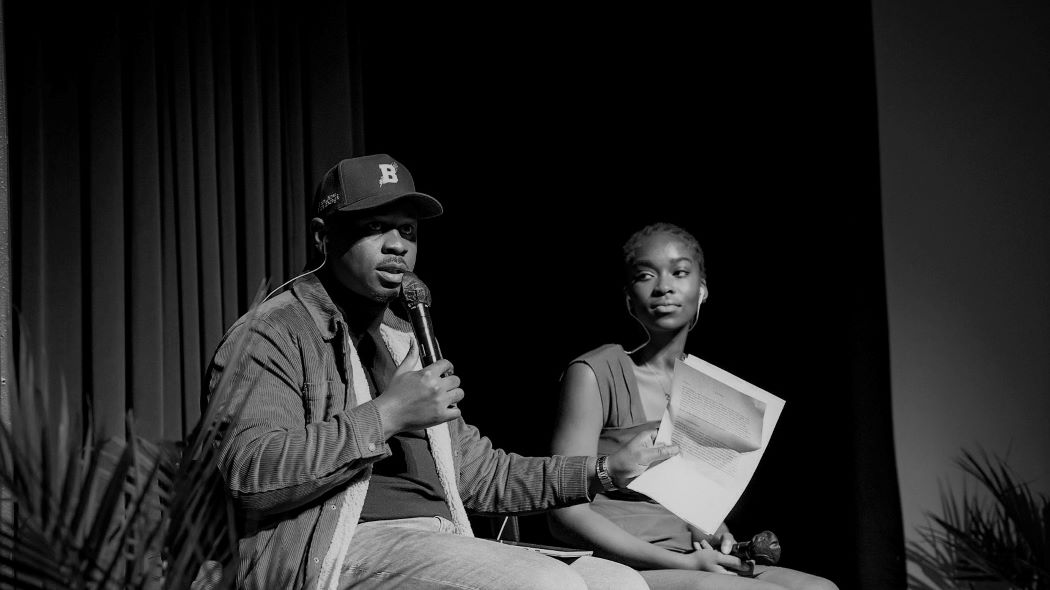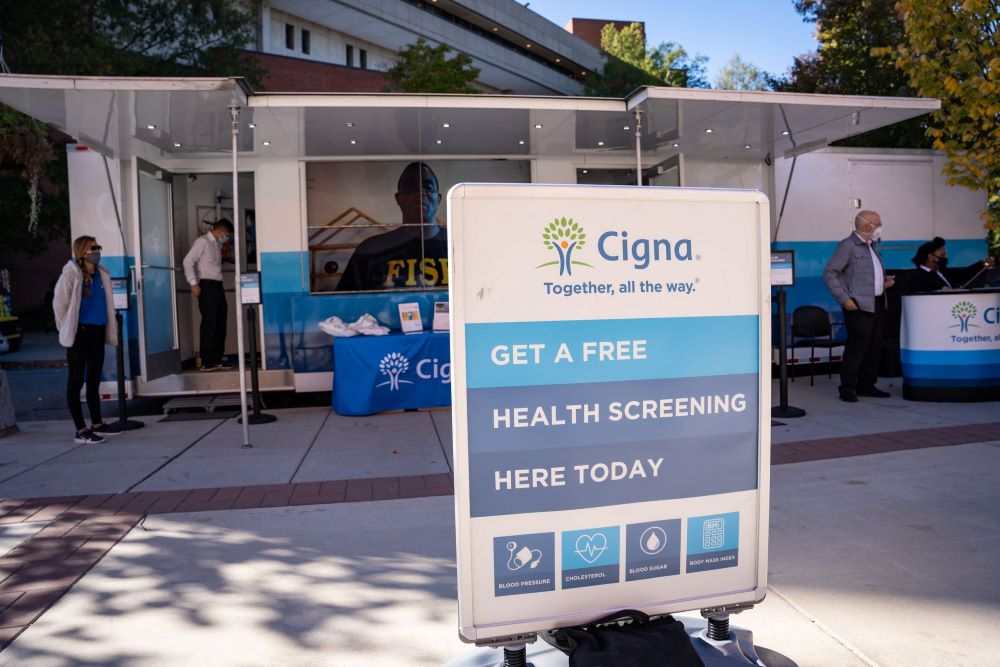
Among Black Americans, in particular, a great deal of mental health stigma persists.
That’s a challenge, because Black people are 20% more likely to experience mental distress due to the systemic racism they’ve experienced throughout their lives. Compared to their white counterparts, mentally ill Black people also have more chronic disease, higher levels of disability, higher rates of inpatient service use, lower rates of outpatient mental health service use, and more barriers to seeking mental health treatment. Additionally, suicides doubled in the Black community during COVID-19 lockdowns, while the number of suicides by white Americans fell by half.
One challenge is that many Black Americans believe discussions about mental illness are not appropriate, even among family. Breaking the stigma can be a key to getting more Black Americans the treatment, education, and resources they need to take care of their mental health.
 That’s precisely why Cigna is working with Jahliel Thurman, founder and CEO of Yard Talk 101, on a program called “Fit for You,” which is meant to drive awareness of mental health challenges in the Black community, particularly among young adults from Historically Black Colleges and Universities (HBCUs). As part of the partnership, we recently hosted a three-part event at Howard University, an HBCU in Washington, D.C. During the event, Cigna’s Health Improvement Tour bus offered free biometric health screenings for students, faculty, and staff. In addition, students learned about Cigna internships and career opportunities during one-on-one conversations, and Thurman moderated a panel discussion about mental health.
That’s precisely why Cigna is working with Jahliel Thurman, founder and CEO of Yard Talk 101, on a program called “Fit for You,” which is meant to drive awareness of mental health challenges in the Black community, particularly among young adults from Historically Black Colleges and Universities (HBCUs). As part of the partnership, we recently hosted a three-part event at Howard University, an HBCU in Washington, D.C. During the event, Cigna’s Health Improvement Tour bus offered free biometric health screenings for students, faculty, and staff. In addition, students learned about Cigna internships and career opportunities during one-on-one conversations, and Thurman moderated a panel discussion about mental health.
“We need to think about mental health in a different way,” said Dr. Lorrie Miller, a behavioral health expert at Cigna, who participated in the panel discussion. Miller said that coupling mental health with physical health is key, because having a healthy mind is essential to living a happy and healthy life. Watch the video below for some of the highlights from the Fit For You event.
Below is a recap of the panel’s conversation on breaking the stigma around mental health in the Black community:
There’s a Pronounced Mental Health Stigma in the Black Community
The only way to start breaking down the mental health stigma in the Black community is to start challenging age-old sayings like “move in silence,” said Kier Gaines, a certified therapist who spoke on the panel. On the contrary, Gaines said, “letting people in helps build connections and a support network.” Getting help has been associated with weakness, particularly among Black men. The more we talk about it, the more we break the stigma, panelists agreed. People need to know they are not alone.
Gaines also pointed to social media as a contributor to mental health stigma. Most people only share their proud moments and happiness across social media, he said. That could make people feel like they are alone in facing mental health issues – and that is not the case.
Seeking Help and Getting Access to the Right Resources is Key
People have a mental health status as well as a physical health status, Dr. Miller said. The difference is, we proactively take care of our physical health through working out, eating well, not smoking, etc., but when it comes to our mental health, we don’t do the same thing.
Think of someone who hurts their wrist, Dr. Miller said. They assess the situation: How much pain they are in, limitations in physical activity, as well as any swelling, and based on that information they will choose a self-treatment option or see a doctor. If they can’t handle the injury alone, they utilize an external resource: a licensed professional. But people typically don’t follow that thought process with their mental health. They ignore issues and try to push through on their own.
Gaines echoed Dr. Miller’s point, adding that having that realization – “I need a rest, I need a break, I’m not being my full self” – is as important as acting on it. Mental health is something that people need to take care of every single day.
Howard alum and actor Lance Gross, another panelist, said he is a big believer in talking and having someone to talk to, especially as a Black man.
“I believe in having a therapist, and I have a therapist for myself and for my relationship,” he said. “I personally find peace in my family. And so often the jobs that I work are out of town, so I am away from my family. And that is when I find myself the most unbalanced.”
Gross makes a point to fly home to be with his family every weekend when he’s working out of town. “That’s my reset,” he said. When spending weekends at home, Gross also journals, reads, and makes time for himself to meditate.
Elizabeth Bolarinwa, director of campus health for the Howard University Student Association, said different people have different ways to reset and unwind. She likes to exercise, for example, but what’s important is carving out time to do what’s right for you and making it part of a routine.
Being Mindful of Your Mental Health
Dr. Miller suggested that people pay attention to what’s going on in their mind. Are you having a particularly stressful day, for example? If that’s the case, it might make sense to take a mental health day, she said, adding that using the day to do homework, if you are a student, or to run around and do errands doesn’t count. “We have to give our brain the space to do what it was meant to do,” she said. “What we think impacts how we feel, which impacts what we do.”
Gaines added that we feed our brains each day affects the status of our mental health, pointing again to social media and urging people to be mindful of which accounts they follow: Are they uplifting or causing negative thoughts? He also emphasized that people should think about what they post with an awareness that what might not affect them could be a point of stress or negative emotions for others.
Bolarinwa said that the most important thing a person can do to address their mental health is to work up the courage to ask for help, adding that a plethora of resources are available. “We definitely need to start talking about [mental health] so that we know it’s a need and start advocating for other people as well as ourselves,” she said.
Each panelist stressed the importance of building and maintaining a support network, whether that be through friends or family. Having people to talk to helps us stay resilient and mindful.
“Focus on one day at a time,” said Thurman, the panel’s moderator.
Helping Someone Through a Mental Health Crisis
“Check-in on your strong friends,” Dr. Miller said. For many, friends are there more than anyone. In turn, we need to create a safe space for them, so they know they can come to us for help as well.
Silence is sometimes the best gift we can give a friend going through a mental health crisis, Gaines said. Sometimes people just need someone to listen. Suggesting seeing a professional could also be helpful.
Additionally, if someone is having a crisis, Dr. Miller suggested not leaving them alone: “Just stay with them,” she said, adding that getting help is critical. “Your job is not to [heal] them. Your job is to get them help."
"After you get them help, take care of yourself,” Dr. Miller said, alluding to the trauma one goes through when witnessing a friend’s major mental health event.
At the end of the discussion, panelists discussed the importance of setting boundaries to keep a healthy work-life balance, including visual cues – like closing your laptop at the end of each day – to indicate a point in the daily routine when you need to take a mental break.
Cigna and Yard Talk 101 are excited about the broad reach of our Fit for You program had in engaging students from over 50 different HBCUs during the mental health panel discussion. The key message was to check in on your mental health and to consider what you need as an individual to keep your body and mind healthy. If you or someone you know is struggling with mental health issues, please know you are not alone. Below are some national and Cigna-specific resources.
Cigna Resources:
- Free webcast: Coping With Racial Trauma, by Dr. Gladys Smith, Psy.D, LPC
- Free webcast: Managing Anxiety, Covid-19 Fears and Concerns, by Thomas Troast, Ph.D, LPC
- Free mental health podcasts: Changing Lives by Integrating Mind and Body (CLIMB)
- Free webcast: Living With Loss and Grief, by Dan Ahlfield, LP, LPC, CEAP
National Resources: